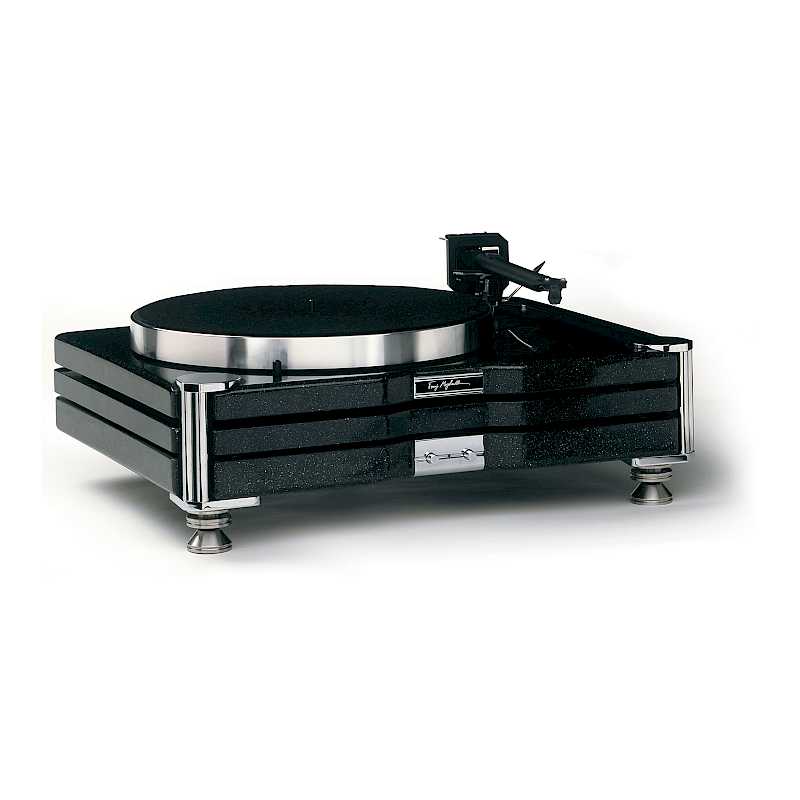
Darmowa dostawa | 5 lata gwarancji | Zwroty w ciągu 30 dni
The Roksan TMS2, released in 2002, was a prime example of engineering excellence in the world of high-end turntables. This flagship model combined a belt-driven, two-speed system with a suspended subchassis that stood out for its rigidity and advanced damping compared to more conventional, free-floating designs.
The precision engineering behind its suspension system was evident, utilising four adjustable suspension pillars, referred to as BLOBs, that provided an exceptional level of isolation. These innovations allowed the TMS2 to deliver unparalleled sound quality while avoiding many of the pitfalls commonly associated with other turntables. One of the standout features was the two-tiered chassis structure, with four distinct chassis layers that worked in harmony to minimise unwanted vibrations and distortions. The motor, a 24-pole synchronous type, was mounted on a separate chassis, employing a unique suspension that allowed for limited rotational movement to absorb torque variations. This design mimicked a clutch, ensuring smooth start-ups and contributing to the overall quiet operation of the turntable.
The platter system, composed of a carefully engineered outer aluminium platter and a self-damping inner platter, demonstrated Roksan's meticulous attention to detail. Both were derived from the design of the earlier Xerxes models, but with the TMS2, Roksan refined the bearing assembly. This self-aligning, true single-point bearing featured tungsten carbide components, which were produced to extreme tolerances by a specialised company known for making bearings for space-grade navigation gyroscopes. This bearing design contributed to the TMS2’s nearly complete absence of unwanted mechanical noise, further enhancing the listening experience.
Roksan’s commitment to both aesthetics and function was also visible in the TMS2’s plinth, which was made from a proprietary composite material. Unlike traditional materials like Corian, which were rejected due to their overly damped sound, the TMS2's plinth was designed to be both acoustically responsive and visually striking. Each plinth featured unique metallic flecks embedded into the surface, giving it a lively, hand-finished appearance with a touch of individuality.
The turntable was powered by the DX2 power supply, housed in a standard casing matching the Caspian series. This power supply provided low-voltage AC to the motor and included speed and standby switching controlled via buttons on the front panel, with a discreet tricolor LED to indicate status.
In terms of sound performance, the TMS2 was nothing short of remarkable. Its pitch integrity and timing were consistently praised, delivering a sound that was stable and free from the subtle pitch variations that can plague other turntables. The TMS2 showcased outstanding separation of instruments and vocals, allowing listeners to experience the full texture and nuance of recordings. This clarity was especially evident in the lower frequency range, where the TMS2 avoided the heavy, leaden bass response found in some mass-loaded designs. Instead, the bass was agile and responsive, while the treble remained open and extended, offering a perfect balance across the frequency spectrum.
Listeners also appreciated its ability to extract and present low-level details, making it an ideal choice for those seeking a high-resolution listening experience. The soundstage was precise, with a sense of depth and layering that created a compelling and immersive listening environment. Even in comparison to top-tier competitors, the TMS2’s combination of vitality, stability, and dynamic range placed it firmly in the upper echelon of turntable design.
TMS2 Turntable - 2002